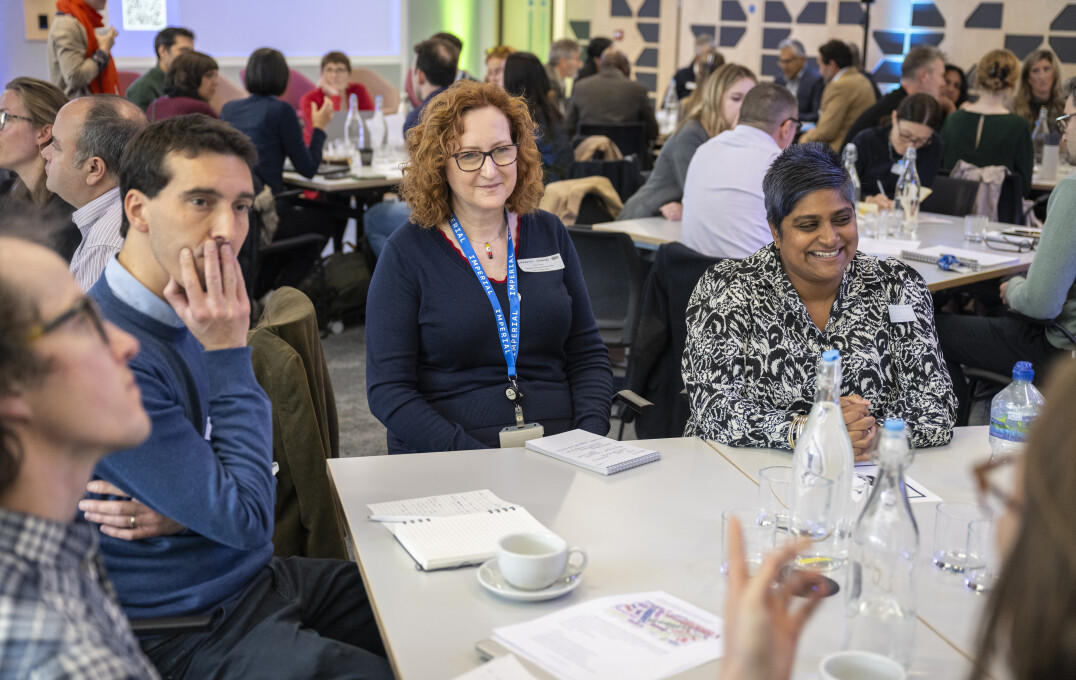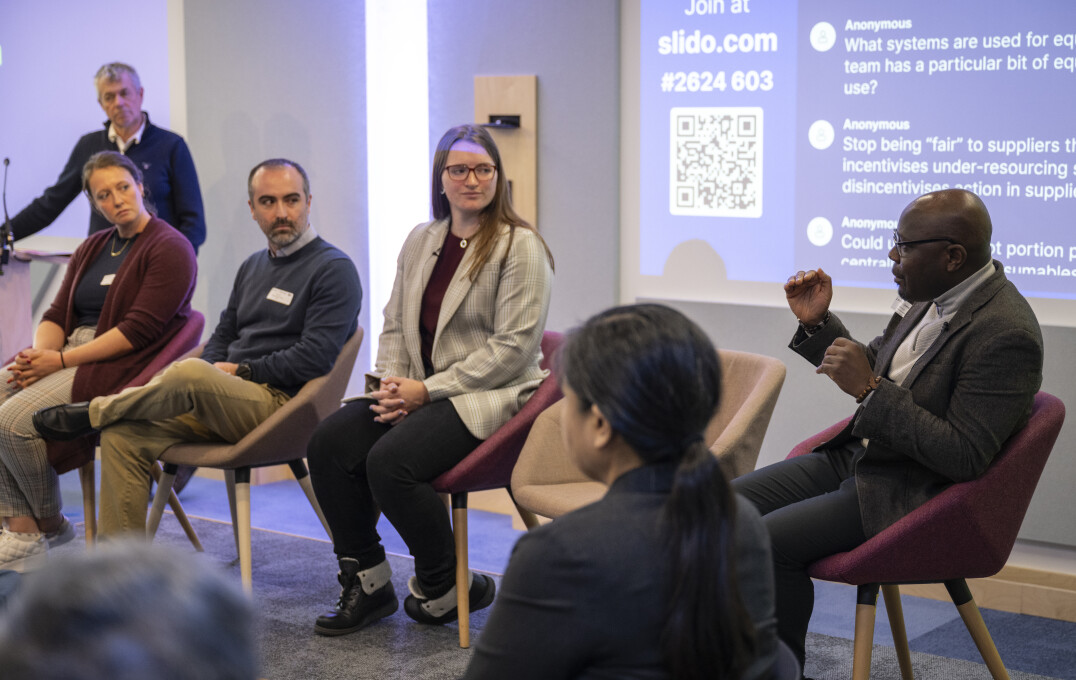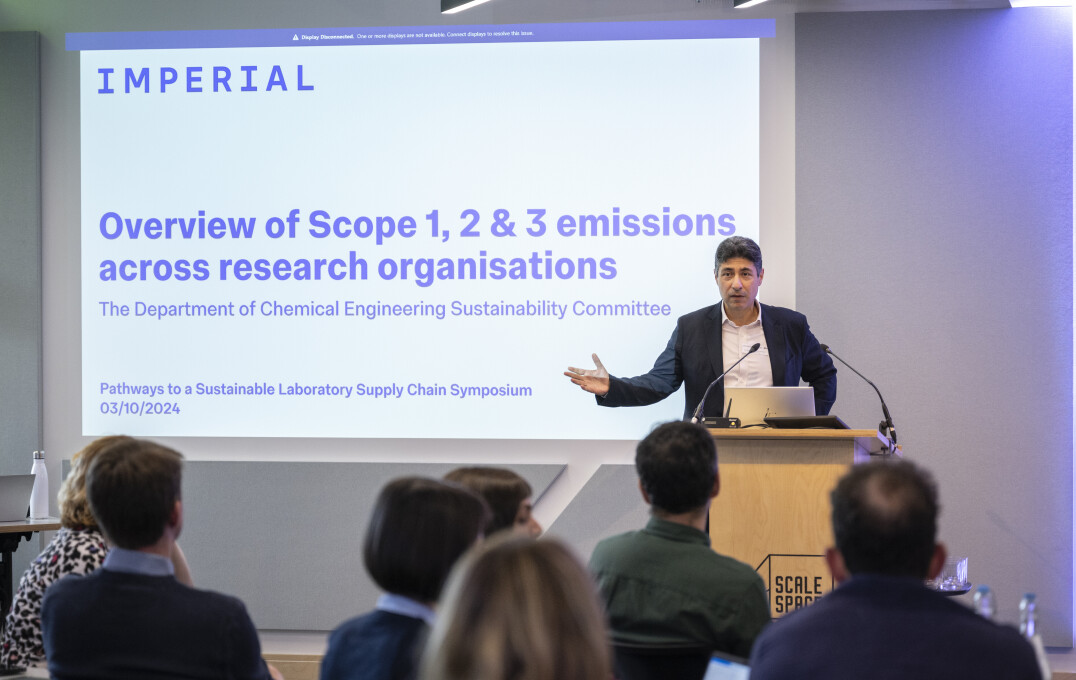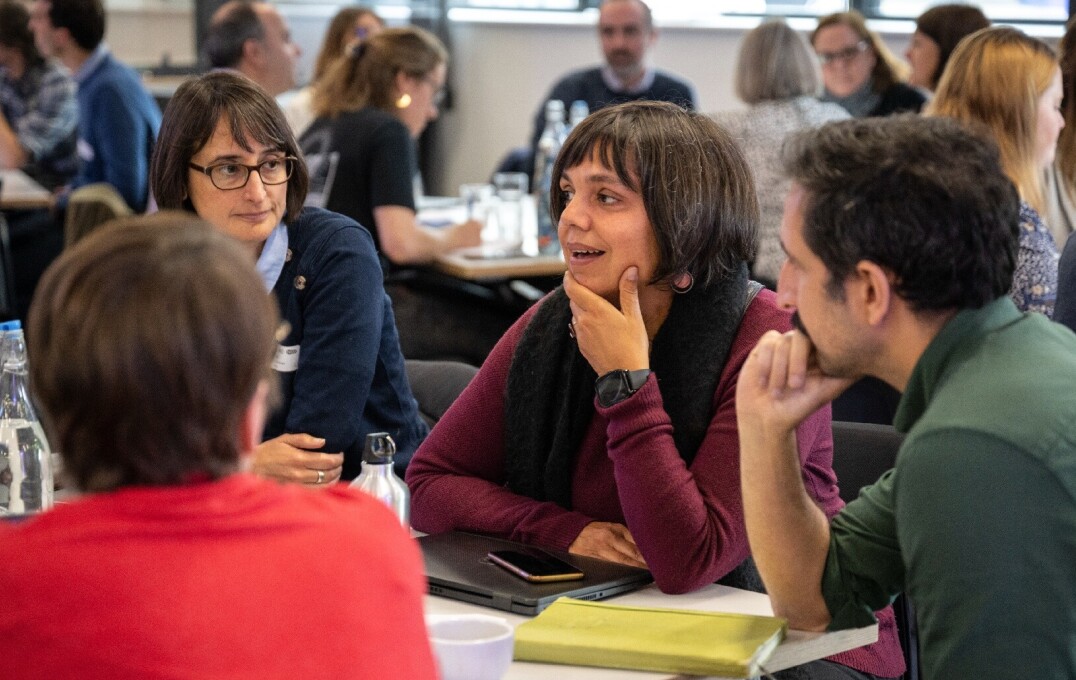8 ways you can help make research labs more sustainable
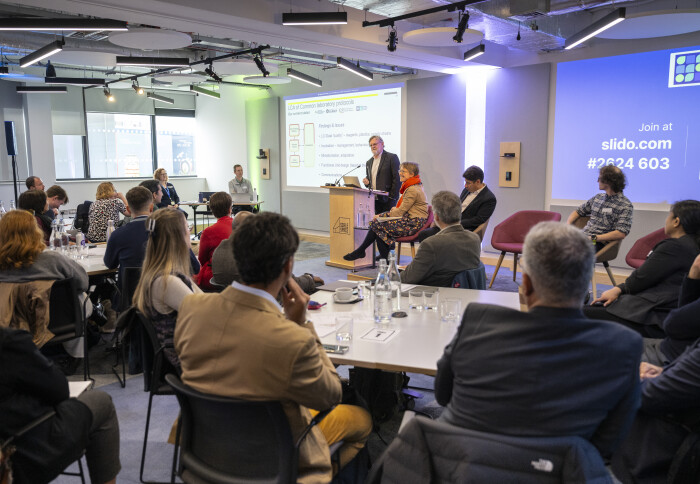
Attendees at the symposium
Improving sustainability in the lab takes a team approach – researchers, technicians, funders, suppliers, and purchasers all need to pitch in.
Laboratories are resource intensive spaces. They use ten times more energy and four times more water than office spaces. Laboratory purchasing alone makes up 20% of Imperial’s procurement carbon footprint.
With over 1400 labs at Imperial, and our ambitious aims as an organisation to reach net zero for our estates by 2040 , it’s clear the actions of our research community will be crucial to success.
It's not a simple task – improving sustainability in the lab requires collaboration between an intricate network of internal and external players.
Sustainability symposium
“Starting the day with a clear intention for action-driven discussion has led to one of the most productive events I have attended since working in sustainability.” Hettie Bawden Sustainability Projects Coordinator at Nottingham Trent University
This month, Imperial hosted an action-orientated workshop to explore how to make lab purchasing and supply chains more sustainable. The ‘Pathways to a Sustainable Laboratory Supply Chain Symposium’ at Scale Space, White City Campus, brought together funders, suppliers, purchasing consortia, purchasers and industry.
Held for the Environmental Association for Universities and Colleges (EAUC)’s and Higher Education Procurement Association (HEPA)’s Responsible Procurement group, the workshop inspired great insights, such as:
- what purchasers can do: buy less and better, ask consistent questions of suppliers on sustainability
- what suppliers can do: use certifications, reduce their footprints, work with their own suppliers, make kit repairable and reusable
- what funders can do: consistent asks for sustainability that help drive good practice, support shared kit and maintenance

These learnings will now be taken forward through a lab supply chain working group under the responsible procurement initiative, chaired by Harriet Wallace, Imperial’s Sustainability Director. As part of this, Allison Hunter (Imperial’s laboratory resource efficiency advisor) will be identifying the most-bought lab products to enable focused work to reduce their footprint. Outputs will also be posted on the Responsible Procurement group webpage.
But what can everyday lab users do to help? It can be difficult to know how to choose the most sustainable products, and to navigate the array of information out there.
Here are some top tips on what all Imperial researchers and technicians can do right now to help make a step change in lab sustainability.
8 ways to improve your lab sustainability
1. Sign up to a lab certification scheme
The Laboratory Efficiency Assessment Framework (LEAF) and My Green Lab are environmental accreditation schemes designed to improve sustainability within higher education teaching and research. By signing up to LEAF or My Green Lab, you will get access to clear guidelines on how to improve sustainability across waste, travel, energy and water use, and procurement; as well as carbon calculators to measure performance.
2. Buy sustainable products
Imperial’s sustainable procurement guidance pack and checklist and the My Green Lab Accountability, Consistency, and Transparency (ACT) toolkit are valuable resources for Imperial staff looking to make the most sustainable choices.
You can also learn more about sustainable procurement at Supply School.
3. Consolidate your deliveries where possible
LabCup, a complete laboratory management system, is being rolled out to departments across Imperial to help lab users simplify the tracking and reporting of inventory data, providing real-time information on inventory levels, storage conditions, and compliance.
4. Recycle your lab equipment
There are lots of easy ways to recycle equipment within Imperial and in the wider sector. Resources include:
- The UniGreenScheme asset resale service for universities
- The Warp It resource redistribution network
5. Share your equipment
Even better, you can share rather than buy equipment in your department or elsewhere, using tools like:
- Imperial’s directory of research facilities
- The UK Institute for Technical Skills & Strategy’s equipment sharing fund
- InfraPortal’s network of UK researchers and innovators
- The UK Research and Innovation infrastructure portfolio
6. Apply to the lab kit fund
More sustainable and efficient equipment can come with a higher initial price tag. The Imperial Sustainability Hub's forthcoming Lab Kit Fund hopes to bridge that financial gap and enable groups to make the more environmental choice. Applications are open to any groups looking purchase, replace or, repair equipment.
Register to hear updates for the Sustainable Lab Kit Fund 2024-25.
Top tip: Funding is more likely to be allocated to those who have already signed up to lab sustainability schemes and measured energy usage of old kits using our meters.
7. Measure your energy consumption
Imperial's Meter Loan Pool Scheme is a free resource for staff to measure electricity consumption of specific equipment and spaces. This program aims to promote energy efficiency by allowing staff to identify potential energy savings in their workplaces.
8. Get sustainability news straight to your inbox
Keep up to date with sustainability news, strategy development and volunteering opportunities by signing up to our Sustainable Imperial newsletter.
For all these ideas and more, check out the Sustainability Hub’s Sustainable Labs advice and resources.
About the symposium
This month’s Pathways to a Sustainable Laboratory Supply Chain Symposium aimed to join the dots between the whole supply chain of funders, researchers, university purchasing and procurement colleagues to see what improvements can be made in reducing the carbon footprint of the research we carry out.
Keynote speakers Professor Mary Ryan (Vice-Provost – Research and Enterprise) and Professor Omar Matar (Head of the Department of Chemical Engineering) shared the significant steps Imperial has already made in its sustainability efforts – from embedding sustainability into tendering processes and contract evaluations, to developing clean energy technologies and infrastructure.
Professor Ryan said: "The symposium exemplified the collective effort needed to tackle these challenges and drive innovation in research while prioritising sustainability. As we strive for a more sustainable future at Imperial, we must recognise that our impact extends beyond our immediate operations."
The symposium was well received by attendees, who found it a lively and engaging environment to delve into the complexities of lab sustainability.
Hettie Bawden, Sustainability Projects Coordinator at Nottingham Trent University, who presented on the day, said: “Starting the day with a clear intention for action-driven discussion has led to one of the most productive events I have attended since working in sustainability.”
Article text (excluding photos or graphics) © Imperial College London.
Photos and graphics subject to third party copyright used with permission or © Imperial College London.
Reporter
Andrew Youngson
Communications Division
Allison Hunter
Department of Life Sciences
